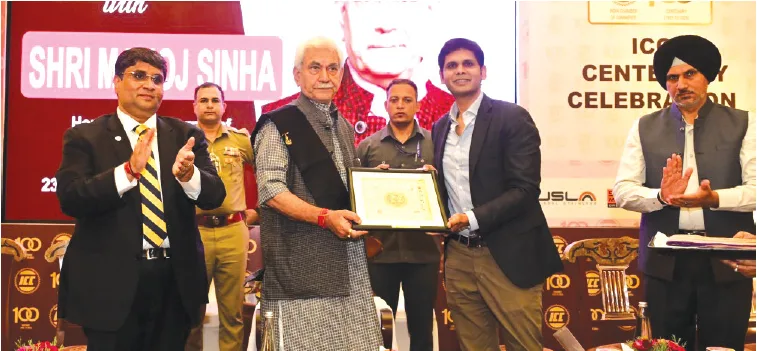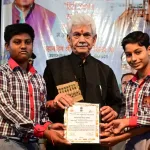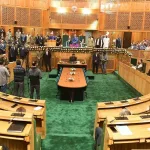Srinagar, Aug 23: Declaring terrorism powerless against the spirit of India, Lieutenant Governor Manoj Sinha on Saturday said that the nation would never succumb to the threats of terrorism. He added that the resilience of Srinagar’s business community itself sends a powerful message to the enemies of the country.
“Terrorism has lost ground in the Valley, and the people of Jammu and Kashmir have themselves risen against it,” LG Sinha said while addressing an interactive session with the Indian Chamber of Commerce (ICC) at The Lalit Grand Palace. “Especially after April 22, I have not seen anything like this in the last five years, Kashmiris openly standing up against terrorists and Pakistan,” he remarked.
Referring to the recent terror attack in Pahalgam, which he described as “an attack on the soul of India,” the LG praised security forces for their swift response in Operation Mahadev, in which three Pakistani terrorists were neutralised.
“Both kinetic and non-kinetic operations are underway to safeguard national integrity,” he said, noting the shift in public sentiment. “Where strikes once paralysed life for 150 days a year, there has not been a single strike in the past five years. Local recruitment of terrorists is now almost zero.”
He also highlighted the transformation in public response to terrorism. “Earlier, the Valley would shut down after a terrorist’s death. Today, people no longer rally in their support. Now, Kashmiris take to the streets against the terrorists, not for them,” he said.
Touching on the economic front, Sinha pointed to tourism as a visible barometer of change. He acknowledged that the Pahalgam incident had briefly impacted the sector, but said recovery was swift. This year, the AmarnathYatra attracted over four lakh pilgrims without heli-services, which had previously carried around 82,000 visitors.
“Had helicopter services been operational this year, the number could easily have crossed five lakh in just 38 days,” he said.
Calling Jammu and Kashmir an emerging hub for private investment, Sinha said that since 2020, the Union Territory has witnessed a surge in industrial proposals and startup activity. Over 1,000 startups have been registered, a third of them led by young women entrepreneurs.
He also said that infrastructure across the UT has improved significantly, citing new roads, railways, airports, and bridges. “Pulwama has now surpassed Srinagar in terms of new industrial units,” he added.
The LG encouraged the Indian Chamber of Commerce to further integrate with the region’s economic ecosystem. “In LalChowk, where daily protests once disrupted life, shops now stay open late into the night, and people are waving the Tiranga. The world has witnessed this transformation,” he said.
Sinha also spoke about broader national economic indicators, including the upcoming GST Council meeting, expressing hope that rationalisation measures would benefit the country, its industries, and markets.
Quoting recent data, he pointed to S&P’s sovereign rating upgrade for India and the Economic Times’ projection of 6.7% GDP growth, saying, “India is on the path to becoming the world’s third-largest economy.”
“India is resilient. We are not a newborn nation, but the world’s oldest civilisation—founded on compassion, brotherhood, and service,” he said.
Citing economist Angus Maddison’s research, Sinha recalled that India accounted for 33% of global GDP in the 11th century, 25% in the 15th, but dropped to 4% by 1947 due to colonial exploitation. “The British extracted $45 trillion from our economy. Today, we have reclaimed over 16% of global GDP share,” he noted.
Lauding the Indian Chamber of Commerce on completing 100 years, the LG praised the organisation for being “a pillar of India’s economy—bridging government and private industry, fostering investment and innovation, and maintaining confidence during challenging times.”
“India was, is, and will remain a developed civilisation. No power can halt its progress,” Sinha concluded. Under the leadership of Prime Minister Narendra Modi, he said, Jammu and Kashmir has begun to dream again, and the industrial sector must play a key role in this transformation.






